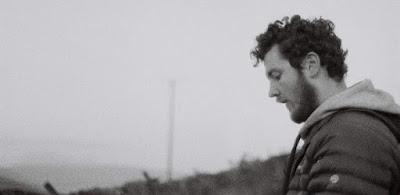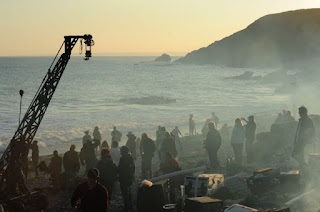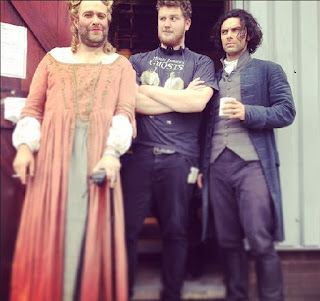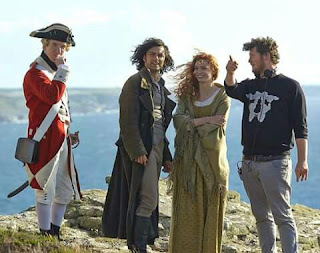 |
| William McGregor by Sam Alberg |
Director William McGregor takes us on a roller coaster of emotions as he steers us through the last four episodes of Poldark Series 1, with scenes ranging from an epic shipwreck to intimate grief. Since wrapping on Poldark William has been busy with a new TV series, One of Us and a feature film, The Dark Outside, so we were delighted when he took time out of his busy schedule to tell us a little about himself and how he found the Poldark experience.
Poldarked: To start at the beginning, William, what inspired you to become a director?
 |
| Aidan Turner, Eleanor Tomlinson and William McGregor Photo: William McGregor Instagram |
P: What makes a good director?
WM: Patience, confidence, natural story telling ability, a good eye,
team player, leader. But most importantly, has something to say!
P: What attracted you to direct Poldark?
WM: My dad was a farmer on Holkham Hall estate, so I grew up in a small farm
cottage just outside the grounds in a hamlet called New Holkham. When I was
older I worked in the gardens of another stately home, Houghton Hall. I spent a
lot of time outside in the country side and surrounded by these beautiful
historical buildings. Because of that I've always been fascinated by history
and our landscape, which developed into a love for all things folk. I love
folklore and fairy tales and I'm fascinated in the origins and purpose of these
stories. I see Poldark very much as a true British folk story; he's a Robin
Hood character in a story about greedy oppressive banks abusing the public
around them. So it appealed to my personal taste and I also felt it was a very
relevant story to tell.
P: What part of your job do you enjoy the most and why?
WM: I honestly love all of it, but the bit I really thrive on is when I am
on set and in the moment. I may have
done months of planning but there and then when you find something with the
actors or a shot grows into something else unexpected. That’s when this art is
alive and most rewarding, when it is spontaneous and serendipitous.
P: Your Director of Photography on Poldark was Adam Etherington who you’ve worked
with a few times. How important is the Director/DOP relationship on set?
WM: Very, especially when you’re on tight schedules as with TV drama. I also
think that a film crew should be like a family and when I find someone I like
working with I hold onto them. I like people who are focused and on it but all
the energy is under the skin so there's no panic. So when I find someone who
fits with my method I like to keep hold of them. A set should be a calm and
creative place.
WM: They are a fantastic cast, so I just wanted to show them that I trusted
them and was there for them. I don't like to talk much. I think directors talk
at their cast way too much: the result is the direction you've given is just self-indulgent
waffle, which you're just confusing your cast with, as the important stuff gets
lost in the mire of words.
Again that’s why knowing your crew is so important. You need the right
environment and chemistry on set so the actors can feel comfortable and do
their best work.
P: What are the challenges of filming on the Cornish cliffs compared to working in
the studio?
WM: One big challenge was shooting the ship wreck sequence for the end of
episode 8.
They were massive climatic scenes for the series, big set pieces at
night with loads of extras, SFX and VFX. We had to rig debris out at sea that
would float in: there was a boat out at sea setting that up and art department
on the beach dressing props into the breaking waves. It was a logistical
nightmare. But add to that the fact that the tide was coming in so you’re
losing your set to the sea and it makes for an interesting few nights of
filming.
 |
| Photo: Mike Alsford |
P: Were there any scenes in Poldark that simply didn’t
work? How did you overcome the problems to make it believable?
WM: Believability and truth are key, especially on something like Poldark
which is effectively a melodrama. There’s a certain amount of suspension of
disbelief but go too far and you lose your audience and, even if that’s only
for a moment, it can be very damaging. So we worked really hard on that and I
think Debbie [Horsfield] did a great job embedding that in the script. When a
scene didn't work it was more to do with serving the story. There were some
scenes that didn't work and were not used simply because they detracted from
the principle story line and didn't contribute enough to the narrative or
themes of the episode. But that’s just a part of the process.
 |
| William McGregor and Aidan Turner. Photo: BBC |
WM: I believe that you’re still writing the script in the edit, it’s an
ongoing process with the writer and producers. So the shape of your story will
evolve in order to make sure your telling your narrative in the best way
possible. I remember that the christening at the start of episode 5 was much
longer, there was a speech from Ross and a conversation between Elizabeth and
Demelza, but the story slowed down and that part of the episode was dragging.
Those two scenes where cut because effectively they were not working hard
enough, they were story beats that were in effect covered elsewhere so they
were cut. Once that happened that part of the episode no longer dragged and yet
you still got the emotional essence of the story.
P: How does working on a show with a large fan following differ from filming a
‘normal’ show? Overall do you consider the interest in Poldark on
social media a help or hindrance to filming?
WM: I'm a young director, so I've only had two dramas on TV, Misfits and
Poldark, both of which have very passionate fans. Which I think is a positive
thing. If it wasn't for the fans getting excited about the show then I think a
lot less people would know about Poldark or have watched it. Social media is a
powerful force.
My next show is an original script by the writers of The Missing, so it’s
a different experience in that respect. But you still hope that once its aired
people will get behind it online. I believe social media can make or break a
show. You only have to look at how many journalists use Twitter reactions to a
show as a news story and you can see the importance and impact of social
media.
P: What’s your abiding memory of working on Poldark? Were you given or
did you take any mementos from the set?
 |
| Mark Hedges, William McGregor and Aidan Turner Photo: Mark Hedges |
As for a memento, I have a prop from Keren and Mark’s wedding. It’s just
a twig with a bit of green and purple ribbon tied to it but it’s of huge
sentimental value.
P: Would you like to return to Poldark in a future series? What projects are you working on now?
WM: Never say never, but I have a desire to set up my own shows and films. I
don't really want to join a returning series. It’s important to me from a
creative point of view to be leading a project and doing new things.
I'm currently finishing the drama I mentioned earlier. It’s a four parter called One of Us set in the Scottish Highlands. I'm calling it my
Celtic Noir. I've also just started casting and location scouting for my first
feature film, which is a folk story set in Snowdonia during the Industrial
Revolution, titled The Dark Outside.
I'd also love to make something about the Pendle Witch trials and adapt
a version of Bluebeard: there’s also an English folk song called Reynardine
which I keep thinking about as a film adaptation. It also has to be said that
I'd be very excited to work with any of the cast and crew from Poldark again,
so hopefully an opportunity comes up where that’s possible.
Many thanks to William for sharing his experiences on Poldark with us. We wish him all the best with his future projects and look forward to seeing them on our screens. Meanwhile, why not give William a follow on Twitter, Tumblr or Instagram?
Related links:
Many thanks to William for sharing his experiences on Poldark with us. We wish him all the best with his future projects and look forward to seeing them on our screens. Meanwhile, why not give William a follow on Twitter, Tumblr or Instagram?
Related links:



No comments:
Post a Comment
Note: only a member of this blog may post a comment.